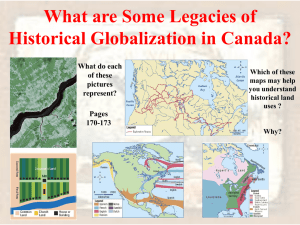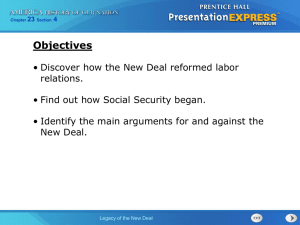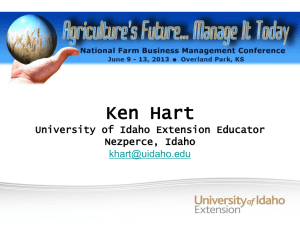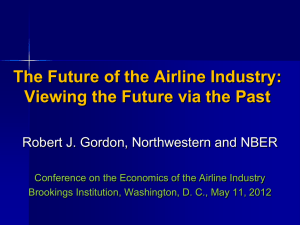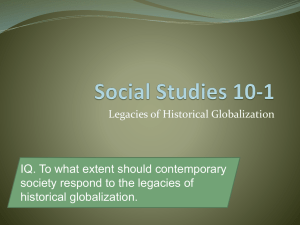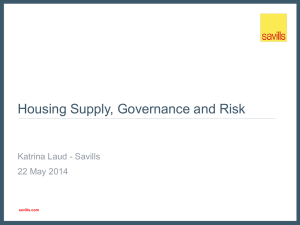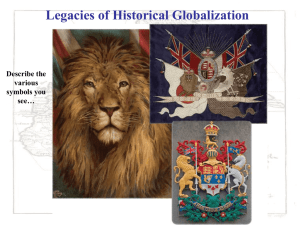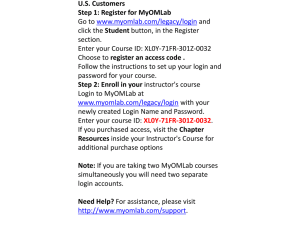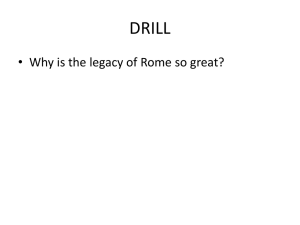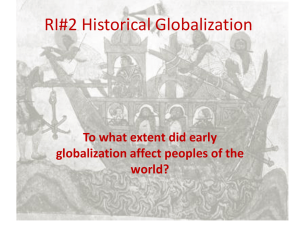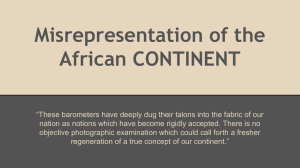Richard Radcliffe Presentation March 2010
advertisement
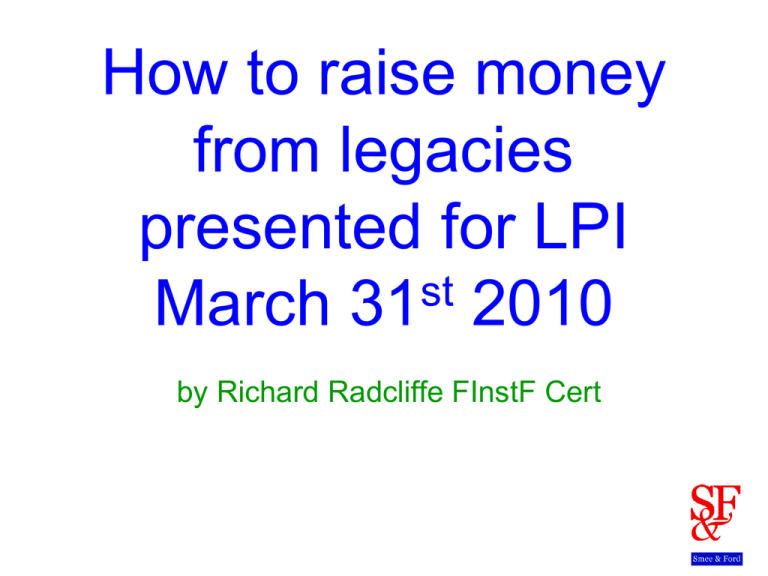
How to raise money from legacies presented for LPI st March 31 2010 by Richard Radcliffe FInstF Cert Who am I? • 30 years in fundraising. • 15 years in legacies • I have met over 15,500 donors volunteers and users of charity services in legacy groups • I have helped write over 500 legacy strategies • And trained 1000s in how to make the ask for legacies • I work throughout the world including Ireland, USA, Canada, all of Europe, Scandinavia, Australasia, India, Israel, Singapore, Malaysia Legacies are not to do with death Giving a legacy is joyful. It is life driven and only death activated. What works? • What works for big charities does not work for small ones • What works for mental health charities does not work for arts organisations • What works for the colleges will not work for hospices • What works for Christians will not work for Muslims or Jews • What works for women does not always work for men • What works for young people does not work for old people • What works for animal charities does not work for human charities • What works for rich people does not work for the “liquid poor” • What works for national charities does not always work for local charities • What works for single people does not work for those with families. Legacy language • Specific = an item • Pecuniary = cash • Residuary = share or percentage or fraction of an estate • Reversionary = legacy goes to charity only after second death • And don’t forget: • Life insurance and death in service schemes How a typical Will with a legacy works • Specific and pecuniary legacies tend to be distributed FIRST • After these, 100% of residue is distributed and any share or percentage or fraction can be left to anyone or any charity (ie 1% to your charity) Legacy strategies • Research competition, statistics, past legacies and then attitudes, motivations through focus groups. • Internal need and awareness • External case for support and legacy/will making messages • Strategy development aim, objectives, target audiences, methods of communication • Build relationships defining and fulfilling communication needs • Set resources and budget • Evaluation - is it possible? The legacy marketplace England & Wales • • • • • • 1991 2001 2008 Population 51.1m 52.8m 53.7m Deaths 569,000 529,000 509K Intestacy 17% 13% Legators 23,000 29,000 35,000 Legacies 65,913 84,750 109,000 Total value to charities: £1.9 billion (incl Scot) Wills and legator profiles in UK • On average you die 4.1 years after your last Will – this is changing and lengthening. • Typical legator in UK: female puts legacy in at age of 68 well educated Owns small property estate value: £300,000 • They are giving to more charities and to a broader range of causes Republic of Ireland statistics • • • • • 2002 2008 Population 3,900,000 4,250,000 Population 65+ 430,000 472,926 Deaths: 29,348 28,479 Legacies worth €12,000,000 (PCI research – top 20 charities) • Irish legacy income should be €40 million Irish Demographics Demographics • Number of older people (65+) will double in 20 years • Number of 85+ year olds will triple • Number of 100+ will increase by 15 times • Longevity threatens future wealth • Security of families threaten legacies • But deaths will go up to 33,000 within 10 years! Legacy focus group agenda • Establish rules (confidentiality, tape etc) and state objectives • General charitable giving and knowledge • Will making patterns and motivations • Different causes and legacy values, entry times • Influences (family, taxation etc) • Legacy giving and preferred method of asking for legacies • Language to be used • Recognition • Views on host charity and its priority as a cause • Thanks • Future communication/action How do people want to be asked? • • • • • • • • • Direct mail Telephone Website Newsletter Advertisement Brochure DVD Event (legacy or general?) One to one? The answers • • • • • • • • • Direct mail – Telephone – Website – Newsletter – Advertisement Brochure DVD Event One to one? – 68% say yes but why? 5% only for a follow up 15% extra information 100% but does it work 5% possibly 5% possibly unknown but good! 95% but what type? 1%…… usually Research results in general • Nobody wants to be asked for a legacy – everyone is happy to be made aware of the need • They want a vision – it proves the need but might not convert them • They want to know you are cost effective – they can’t complain when dead • They like to come to events to be made aware of the benefits of legacies • They know they need an up to date Will – they are happy to be reminded When will you die? • • • • • • • On average: Without a Will At 69 With a Will At 79 With a Will with a legacy to charity At 87 Legacy vision • • • • • • Must be: Fundable Unique Credible Inspirational Tangible Best legacy campaigns can be cash free • PLEASE just think: • Where can the following words and phrases be used? On thank you letters? On email signatures? On the back of envelopes? Posters in church Halls? Advertisements in parish newsletters? In supporter newsletters? At community talks and events? Language • • • • Which do you prefer? A bequest in your Will A legacy in your Will A gift in your Will Remember us in your Will Phrase development • Imagine the difference a gift in your will would make to secure our future for generations to come • If or when the time is right for you to include a gift in your Will please remember us. • Our success relies on donations and gifts in Wills • 20% of our income is from legacies • 1 in 5 beneficiaries are helped thanks to gifts in Wills • We get no legacy income so imagine the difference a gift in your Will would make! More phrases! • After you have provided for your own family and friends perhaps you would consider including our charity in your will • or • We fully recognise your loved ones come first but perhaps you could find room in your will for our charity too. • €50 or €5 million – any legacy will help however large or small even if we prefer big ones! • Every gift in every Will makes a difference • Live eight years longer leave us a legacy! • Pay as you go • Die now pay later! (Only joking) Objective setting – the more advanced stuff!!! • What are objectives when communicating with committed donors? • What is the objective of articles in your newsletter? • What is the objective of your legacy brochure? • Never set “make aware of legacies” as an objective Will writing advice and discounted and free wills • • • • • • Are they worth it? Would service users benefit from them? What is a special offer? Who would dislike it? Is it worth the risk? Our general guidance is that Will making offers are “causally sensitive” and only acceptable as a “user service” – ie in hospices or those with learning difficulties/mental health Legacy targets • What are objectives for: • Donors: committed regular cash occasional Lapsed Event attenders (challenge and social) Major donors Legacy targets • What are objectives for: • Volunteers: service providers administration savers Fundraising Event helpers Legacy targets • Service users and their families: are they legators or promotors? • Lawyers/writers of Wills: are they interested? If so why and how can they help • Staff – what is their role? • Trustees/board members – oh hell! Key issues • Direct Mail: • to whom and why? • • • • • • • Is it an appeal? Length – is it an issue? Who signs? Integrate or separate? Enclosures: what are they? Response mechanism? You must decide what is right for each target audience – you cannot send everyone the same letter. A possibly good DM idea • Thanks you for your support – its been brilliant. • One other way of supporting us is through a gift in your Will. If this is something you might like to do, then we enclose the wording for your Will, and a codicil just in case you already have a Will. All you have to do is send it to your professional adviser or file it for when the time is right for you. If this is not a way you would like to support us then we fully understand. If you have already done this then a huge thank you! Response form • Easy response: I have already included charity x, I might in the future , please contact me , Not for now thank you ! Key issues • Legacy brochure: • to whom and why? • What information? IHT? How to make a Will? Wording? Wealth calculator? Legacy vision? Technical data? Stories by whom and what stories? Response mechanism? Legacy brochure • Answer • • • • • • • • • Legacy vision Past legacy stories Wording for Will Tax savings? (but not that important) Glossary of terms? Response mechanism How to write a Will Wealth calculator Technical data? Website • • • • • Legacies: separate from Donate button What information - stories What should be downloadable? Wording! Which stories – past legacies and vision Response? Personal email address Legacy section of website • • • • • • • • • • • Answer Legacy vision (opening link on home page) Past legacy stories Wording for Will Explanation of different types of legacies Explanation of tax savings? Glossary of terms? Response mechanism How to write a Will Wealth calculator Technical data? Telephone • Is it sales or relationship management? • Should legacies be incorporated into an upgrade call • Who can be called? • What happens next? • Or do you just not do it! Newsletter • Strategic development: • Stories: past legacies (told by you); Will writing (by lawyer), vision (by CEO or other worker), quirky legacy stories, own stories of why you have a Will… or don’t!. • Response mechanism DVD • Short – max 5 minutes if shown in a meeting. 30 minutes if played at home • Story telling Event • • • • • Is it legacies only Is it an AGM Is it an open day? Is it just a thank you Best possibly a thank you to all supporters? • What is the call to action? • What is the follow up? Annual review ☺ • • • • Thank you Past year’s success Current use of funds - prudence Future ambitions and ways to make dream come true (ie a legacy!) • Response mechanism Advertising • • • • • Legal – only a reference Local – ACE if free National - expensive Local newsletters ACE Coupon please! Publicity/PR and others! • Press releases • Local community development: buses, shops, libraries, community halls • Posters, email signatures, backs of envelopes, prayer cards. Local churches and places of worship, bookmarks! Drip drip drop • • • • Branding is an issue! Anaphora - repetition of key words and Epizeuxis – emphatic repetition • (Please remember this word for scrabble) Tasks • • • • • • • • • Next of kin research? Focus groups? Information internally to get support? Objective setting for each target audience Objective setting for each method of communication Getting the right stories told Integrating legacies into everything Setting activity levels as a measure Hope it works!!! If you need me • Richard Radcliffe • richard@theshed.vispa.com • Mobile: +447771896680 • Office +441832 710 893 • The Manse, Main Street, Bythorn Cambs UK PE28 0QR
